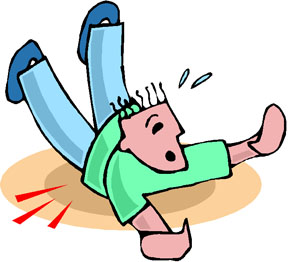Many mature people suffer from some form of arthritis, high blood pressure, osteoporosis, and vision or hearing loss. Any of those conditions could cause problems with balance and lead to falls. According to the American Academy of Orthopedic Surgeons, falls are the leading cause of injuries to senior citizens.
One fall can result in significant mobility problems, from fear of falling again, to serious injuries. There are many steps that seniors can take to lessen their chances of falling.
Common Causes of Falls:
Health issues. Conditions like those listed at the beginning of this article, along with others can cause a person to suffer dizziness or lightheadedness. A loss of balance could lead to a fall.
Poor lighting. I often walk around the house in the dark in the wee hours of the night because I have night owl tendencies. I figured that since I know my way around, I’d be just fine. But what if a kitty walked in front of me in the dark? I’d be in trouble. This did happen to me at my son’s home near Little Rock a few years ago. I turned out the kitchen light and headed through the living room to the front stairway in the dark. Looking across the room, it appeared to be a clear path. But as I rounded the back of the sofa, I tripped over my grandson’s Golden Retriever who was sleeping on the hardwood floor. I fell and was very lucky that all I broke was a toe. Plug in small night lights around your house to prevent such events from happening. I will be doing that immediately! One would think I’d have learned that lesson before now!
Throw rugs. It goes without saying that small rugs lying on hardwood or tile floors are subject to sliding, and curling up on the ends. That’s an accident waiting to happen. There is a tape available that holds these rugs in place. The rugs can be moved to a new location without changing the tape each time.
Loose wires. In this age of multiple electronics, we all have too many wires and cords lying around. You can purchase special covers for those cords or just use bread wrapper ties to bind several together and tuck them away behind furniture where no one will accidentally trip over them.
Small pets. I already mentioned my fall over a large Golden Retriever, but smaler dogs and cats are an even bigger hazard. Our bulldog, Maggie, will not stay out of the kitchen when I cook. So she automatically goes in her crate when I prepare dinner. Otherwise, she would be right beside me and I’d likely trip over her. Dogs and cats don’t understand the danger they could create, so before you plan to work or play in an area where your pet is likely to hang out, remove the animal and protect both of you.
Large pets. In another article I discussed how to choose a pet for a senior. One thing to remember, especially if a person with balance issues will be required to take the pet down stairs to go for walks, is to either own only small pets or hire a pet walker.
Slippery floors. Hardwood and tile floors are lovely, but they won’t seem so nice if you slip on them and fall. Be careful what products you use on your floors. Some cleaning products can leave a very slippery surface. Take care in the kitchen to clean up spills the minute they occur.
Loose handrails on stairs. Sturdy handrails are installed on stairways for a reason. Be certain yours are screwed in tightly with no breaks or unsafe spots.
Uneven surfaces. In the yard, make sure children’s toys, garden hoses and other small items are picked up and put away. Walking on an unseen rake head or tripping over a hose would be an accident waiting to happen. Watch for loose or uneven wood planks on decking. The same is true indoors. Keep small items picked up so they don’t surprise you later in a bad way. If there are sidewalks in your neighborhood that have become uneven, call the county to get them repaired.
Bath tubs and showers. Check the grab bars on your shower wall to be sure they are secure. Install tape strips that rough up the floor of your tub or shower to prevent falls. Watch out for wet spots on the bathroom floor.
A website I found suggested the following measures to help prevent falls:
Get a medical examination. Regular physicals could uncover any undiagnosed conditions that could place you at risk for falling.
Get regular eye exams. Poor vision can increase the risk of falling.
Eat regular, healthy meals. Poor nutrition or skipping meals can make you weak and subject to dizziness.
Avoid excessive alcohol. If you have seen a drunk in action, then you know that the condition can cause dizziness and a loss of balance.
Check side-effects of your medications. Some can cause dizziness or confusion.
Exercise regularly. Focus on strengthening leg muscles, balance and flexibility.
Wear proper shoes. High heels are an obvious danger and contribute to balance issues. Be sure your shoes fit well. Sandals or slippers without supportive straps create opportunities for falls.
